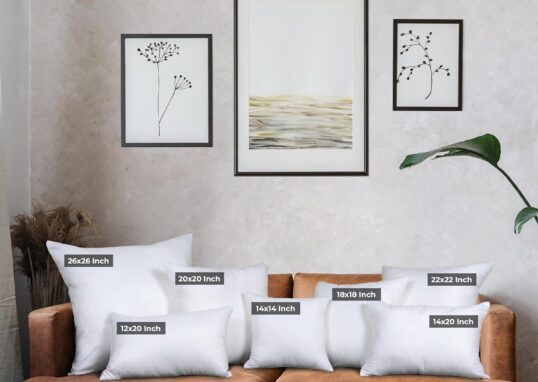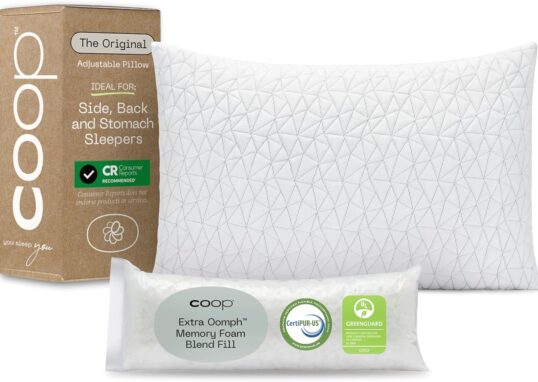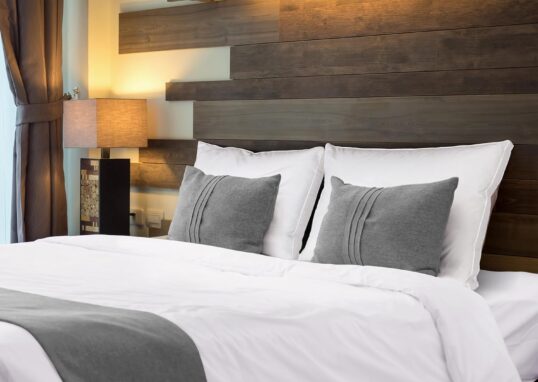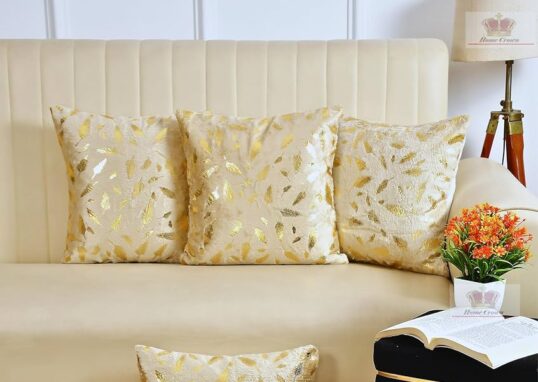
Did you know that we spend approximately one-third of our lives sleeping? With so much time dedicated to rest, the quality of your bedding—particularly your pillowcases—deserves thoughtful consideration. Among premium bedding options, Egyptian cotton percale pillowcases stand out as a hallmark of luxury, comfort, and durability. But what makes them special, and are they worth the investment for your sleep sanctuary?
This comprehensive guide explores everything you need to know about Egyptian cotton percale pillowcases—from their historical origins and unique properties to practical care instructions and ethical considerations that many competitors overlook.
The Legacy of Egyptian Cotton: A Rich History of Excellence

The story of Egyptian cotton begins in the fertile Nile Delta, where ideal growing conditions create what many textile experts consider the world’s finest cotton variety. Unlike standard cotton, Egyptian cotton belongs to the Gossypium barbadense species, distinguished by its exceptionally long fibers (or “staples”).
From the Nile to Your Bedroom: The Journey of Premium Cotton
Egyptian cotton’s superiority isn’t just marketing hype—it’s rooted in botanical advantage. The Nile Delta’s unique combination of rich soil, consistent humidity, and abundant sunshine creates ideal growing conditions for cotton plants to produce longer, stronger fibers. When spun into yarn, these long-staple fibers create smoother, more durable fabric with fewer exposed ends than shorter cotton varieties.
This legacy of quality dates back to the 1820s when modern Egyptian cotton cultivation began under Muhammad Ali Pasha. Today, genuine Egyptian cotton remains a premium textile choice, though it accounts for less than 1% of global cotton production—making authentic products particularly valuable.
Egyptian vs. Pima/Supima: Understanding the Distinction
While shopping for premium cotton, you’ll likely encounter Pima and Supima varieties alongside Egyptian cotton. Here’s how they compare:
| Cotton Type | Fiber Length | Growing Region | Key Characteristics | Best For |
|---|---|---|---|---|
| Egyptian | Extra-long staple (1.4″-2″) | Nile River Valley, Egypt | Finest, most luxurious feel; excellent durability | Luxury bedding, premium towels |
| Pima | Long staple (1.3″-1.5″) | USA, Peru, Australia | Very soft and durable | High-quality everyday bedding |
| Supima | Long staple (1.3″-1.5″) | USA only (licensed) | Consistent quality, trademarked | Premium American-made products |
| Standard | Short staple (0.8″-1.1″) | Worldwide | More prone to pilling, rougher feel | Budget bedding |
While all three premium varieties offer exceptional quality compared to standard cotton, Egyptian cotton’s extra-long fibers typically produce the smoothest, most luxurious fabric—particularly when crafted into percale weave.
Understanding Percale: The Science Behind the Crisp Feel
When shopping for Egyptian cotton pillowcases, you’ll frequently encounter two main weave options: percale and sateen. Though both can be made from the same high-quality Egyptian cotton fibers, the weaving technique creates distinctly different fabrics.
Percale vs. Sateen: Choosing the Right Weave for Your Sleep Style
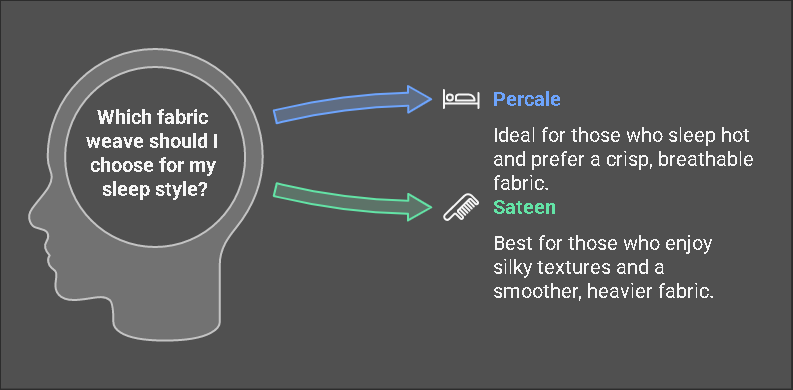
Percale features a simple one-over, one-under weave pattern that creates a lightweight, crisp fabric with exceptional breathability. In contrast, sateen uses a more complex weaving technique (typically four-over, one-under) that exposes more thread surface, creating a smoother, silkier finish with a subtle sheen.
Consider your sleep preferences when choosing between these weaves:
- Choose percale if: You tend to sleep hot, prefer a crisp “hotel-like” feel, prioritize breathability, or live in a warmer climate
- Choose sateen if: You prefer silky-smooth textures, sleep cool, want a subtle sheen, or desire a slightly heavier fabric
The Science of Sleep and Fabric: Why Percale Promotes Better Rest
Research suggests that body temperature regulation plays a crucial role in sleep quality. During sleep, our core temperature naturally drops, and environments that support this cooling process can promote deeper, more restful sleep.
This is where percale’s breathability becomes particularly valuable. The crisp, open weave allows for superior air circulation, helping to dissipate body heat and moisture throughout the night. For hot sleepers especially, this can mean the difference between restless tossing and deep, restorative sleep.
Technical Specifications: What to Look For
When evaluating Egyptian cotton percale pillowcases, several key specifications determine quality and performance:
Thread Count: Separating Fact from Fiction
Thread count refers to the number of horizontal and vertical threads per square inch of fabric. While many assume that higher is always better, this isn’t necessarily true.
For percale, the ideal thread count ranges from 200-400. Within this range, you’ll experience the perfect balance of durability and breathability. Beyond 400, manufacturers often use multi-ply yarns to inflate numbers without improving quality—potentially sacrificing the crisp, lightweight feel that makes percale desirable.
Single vs. Double Ply: The Important Distinction
Thread ply refers to how many yarns are twisted together to create each thread. Single-ply fabrics use individual strands, creating a lighter, more breathable weave ideal for percale. Double-ply uses two strands twisted together, creating stronger but potentially heavier fabric.
High-quality Egyptian cotton percale typically uses single-ply construction to maintain lightness while relying on the natural strength of long-staple fibers for durability.
Fabric Weight and Its Impact on Comfort
Fabric weight, measured in grams per square meter (g/m²), indicates the heft of the material. Quality Egyptian cotton percale typically falls between 110-140 g/m², striking the perfect balance between substantial feel and breathable lightness.
This specification is often overlooked but can significantly impact comfort—too heavy, and percale loses its characteristic crispness; too light, and it may feel insubstantial or fragile.
The Long-Term Value Proposition: Durability and Performance
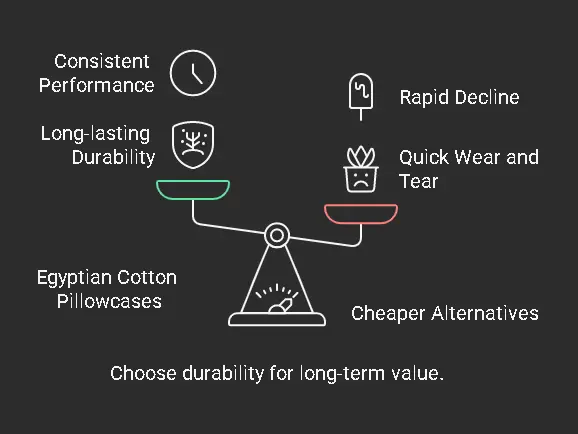
While Egyptian cotton percale pillowcases typically command premium prices, their exceptional durability offers compelling long-term value. Unlike cheaper alternatives that pill, thin, or fade after relatively few wash cycles, high-quality Egyptian cotton percale can maintain its distinctive crisp feel and appearance for years with proper care.
Budget Considerations: Is Premium Egyptian Cotton Worth It?
When evaluating whether to invest in Egyptian cotton percale pillowcases, consider these factors:
- Initial cost vs. longevity: Though more expensive upfront, quality Egyptian cotton percale often outlasts cheaper alternatives by years, offering better value over time.
- Sleep quality impact: If temperature regulation affects your sleep quality, percale’s superior breathability may justify the investment through improved rest.
- Skin sensitivity: The smoother surface of long-staple Egyptian cotton creates fewer friction points, potentially benefitting sensitive skin.
For budget-conscious shoppers, a 200 thread count Egyptian cotton percale offers many of the benefits of higher thread counts at a more accessible price point. The difference will be subtle—slightly less softness but with comparable breathability and durability.
Real-World Performance: How Egyptian Cotton Percale Ages
Unlike many synthetic or lower-quality cotton fabrics that deteriorate quickly, properly maintained Egyptian cotton percale actually improves with age. The initial crispness gradually softens into a comfortable, lived-in feel while maintaining structural integrity.
Long-term users frequently report that their Egyptian cotton percale pillowcases remain comfortable and intact after 5+ years of regular use—a testament to both the quality of the fiber and the durability of the percale weave.
Environmental and Ethical Considerations
When purchasing luxury bedding, sustainability and ethical considerations deserve attention—aspects often overlooked by many competitors in the Egyptian cotton market.
Sustainability Practices in Egyptian Cotton Production
Traditional Egyptian cotton cultivation requires significant water usage, raising environmental concerns. However, several progressive producers have implemented water conservation techniques, organic farming practices, and reduced chemical usage.
When possible, look for Egyptian cotton products with certifications like OEKO-TEX® Standard 100, which ensures textiles are tested for harmful substances and produced with environmental considerations.
Ethical Sourcing: Supporting Fair Labor Practices
The cotton industry has faced historical challenges regarding labor practices. Responsible manufacturers now emphasize fair wages, safe working conditions, and transparency throughout their supply chains.
Look for brands that highlight Fair Trade certifications or provide transparency about their manufacturing processes. This information indicates a commitment to ethical production—a value increasingly important to conscientious consumers.
Care Instructions: Maintaining Your Investment
Proper care dramatically extends the life of Egyptian cotton percale pillowcases while preserving their distinctive qualities. Follow these expert guidelines:
Washing and Drying Best Practices
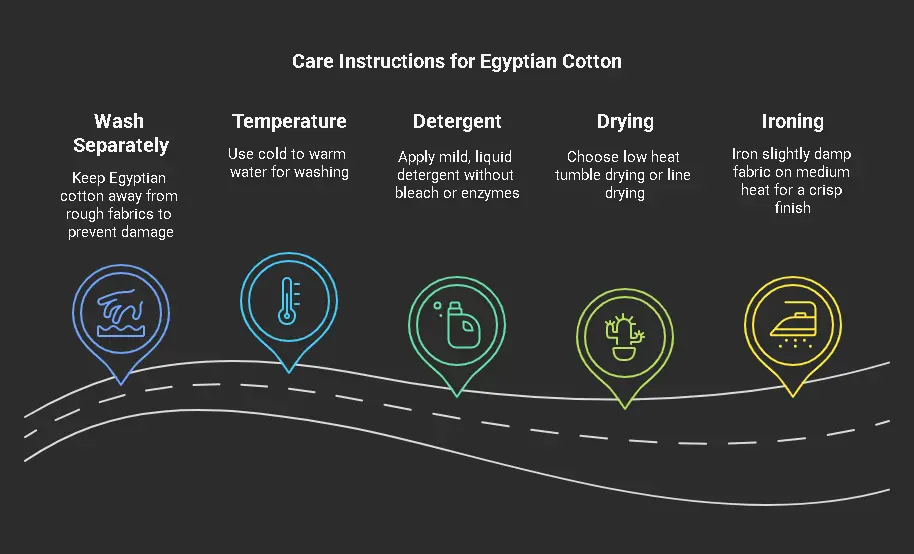
For optimal care:
- Wash separately: Keep Egyptian cotton separate from rougher fabrics to prevent friction damage
- Temperature: Machine wash in cold to warm water (30-40°C/86-104°F)
- Detergent: Use mild, liquid detergent free from bleach and enzymes
- Drying: Tumble dry on low heat or line dry for best results
- Ironing: Iron on medium heat while slightly damp for the crispest finish (optional)
DIY Solutions for Common Issues
- Stubborn stains: Create a paste with baking soda and water, apply to stains, and let sit for 30 minutes before washing normally
- Natural brightening: Add 1/4 cup of lemon juice to your wash for gentle whitening
- Softening without chemicals: Add 1/2 cup of white vinegar to the rinse cycle for naturally softened fabric without compromising percale’s crisp character
Following these care instructions will help your Egyptian cotton percale pillowcases maintain their quality and extend their lifespan, maximizing your investment.
Shopping Guide: Finding Authentic Egyptian Cotton Percale
With the premium prices that Egyptian cotton commands, the market unfortunately includes misrepresented products. Here’s how to ensure you’re getting genuine Egyptian cotton percale:
Certification and Authentication
Look for the Cotton Egypt Association’s seal, which includes a QR code verification system. This certification confirms that products contain genuine Egyptian cotton grown in the Nile Delta.
Additionally, reputable manufacturers will specify the exact cotton composition and origin of their products. Vague terminology like “luxury cotton blend” without specific mention of Egyptian origin may indicate a product contains minimal actual Egyptian cotton.
Trusted Brands and Quality Indicators
Several reputable brands have established track records for authentic, high-quality Egyptian cotton percale products:
- Pure Parima offers certified Egyptian cotton with transparent sourcing
- King of Cotton specializes in premium Egyptian cotton bedding with various thread count options
- Peacock Alley provides luxury Egyptian cotton percale with detailed weave information
- California Design Den offers OEKO-TEX certified Egyptian cotton products
- Hale Bedding features 300 thread count Egyptian cotton percale
When shopping, feel the fabric if possible. Authentic Egyptian cotton percale has a distinctive crisp feel with a matte finish. The fabric should feel substantial yet lightweight, with a smooth surface free from slubs or irregularities.
Conclusion: Investing in Quality Sleep
Egyptian cotton percale pillowcases represent more than just luxury bedding—they’re an investment in better sleep quality, skin health, and sustainable consumption. Their exceptional breathability, durability, and refined feel offer tangible benefits that justify their premium positioning for many discerning consumers.
Whether you’re a hot sleeper seeking temperature regulation, someone with sensitive skin needing a smoother fabric, or simply a quality enthusiast who appreciates craftsmanship, Egyptian cotton percale offers distinctive advantages worth considering.
Ready to experience the difference? Explore these premium Egyptian cotton percale pillowcases that embody the qualities we’ve discussed. For those seeking luxury hotel-quality options, these 400 thread count sets deliver exceptional breathability and crispness. If you’re interested in an ethically-produced option, these OEKO-TEX certified pillowcases combine luxury with peace of mind. For hot sleepers specifically, these cooling Egyptian cotton percale options maximize temperature regulation. And if you’re looking for the perfect gift, these gift-boxed luxury sets make an impressive presentation for someone special.
By choosing quality over quantity and investing in bedding designed to last, you’re not just purchasing pillowcases—you’re enhancing your daily sleep experience for years to come.

